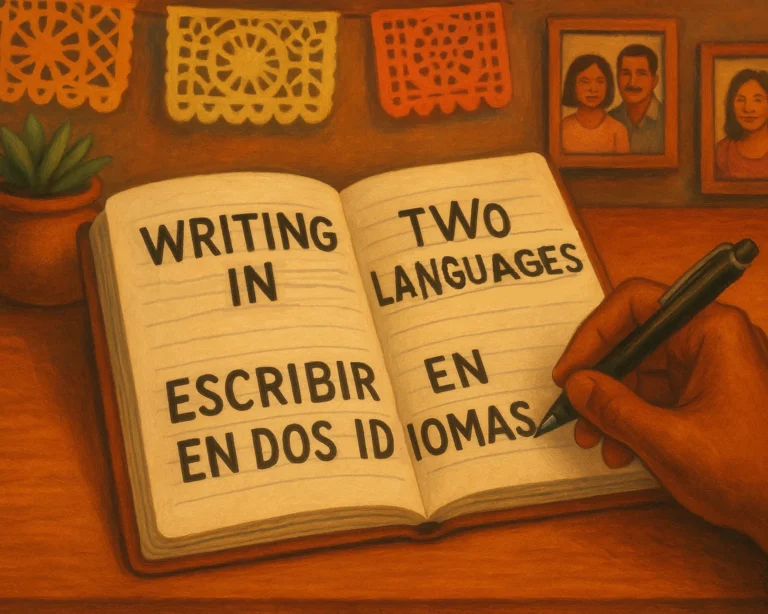Writing is an act of self-expression, a way to share one’s perspective and experiences with the world. For Latinx writers, the act of finding your voice is particularly significant—it’s not only about expressing your individual thoughts, but also about navigating the intersection of culture, identity, and often, the challenges that come with being part of an underrepresented group in literature.
Being a Latinx writer means carrying the weight of multiple stories: your own personal narrative, the legacy of your culture, and the experiences of your community. While this can be empowering, it can also come with unique obstacles. From the pressures of representation to overcoming language barriers, the road to finding and confidently expressing your voice can be complex. But it is also deeply rewarding.
In this blog post, we’ll explore some of the challenges Latinx writers face and offer tips on how to overcome them in order to find your authentic voice.
1. The Pressure of Representation
As a Latinx writer, you may often feel that the stories you write need to represent the entire Latinx community. This can be an overwhelming pressure, especially given the rich diversity within the Latinx population. After all, there is no single Latinx experience—our identities are shaped by our countries of origin, migration journeys, family histories, and personal experiences.
It’s important to remember that while your work may resonate with others in the Latinx community, it doesn’t have to speak for all Latinx people. Your voice is unique, and it is essential to allow your stories to reflect your own truth, whether or not it aligns with mainstream expectations.
Tip: Focus on writing authentically, rather than trying to fit your work into a particular mold. The more genuine and personal your stories are, the more they will resonate with readers—whether or not they share your cultural background.
2. Navigating Language and Bilingualism
For many Latinx writers, language is both a gift and a challenge. Writing in both English and Spanish (or even blending the two) can be a powerful way to connect with both Latinx and broader audiences, but it also presents its own difficulties.
If you’re writing in two languages, you might find that one feels more comfortable or authentic than the other, or you may feel torn between sticking to your native tongue or adapting to the expectations of the publishing world. The balance between using both languages can be tricky—especially when mainstream publishing often prioritizes English over Spanish or Spanglish.
Tip: Embrace bilingualism as a tool of expression rather than a barrier. Use both languages as they serve your storytelling, whether it’s by incorporating cultural nuances or capturing the complexity of living between two languages. Don’t be afraid to embrace Spanglish or regional dialects—they can help make your writing more authentic and relatable to a broader audience.
3. Confronting Stereotypes and Misrepresentation
One of the most significant challenges faced by Latinx writers is the pervasive stereotypes that often color public perceptions of our community. Whether it’s the “immigrant story,” the “fiery Latina,” or the “gang member” stereotype, these limited portrayals can be damaging and restrictive. As a writer, you may feel pressure to either subvert these stereotypes or, conversely, feel boxed into writing only certain kinds of stories to meet expectations.
The key is to move beyond these stereotypes and tell stories that are complex and multidimensional. Latinx characters don’t have to fit into predefined categories—they can be flawed, nuanced, and dynamic, just like any other characters.
Tip: Write characters who are multifaceted and real. Resist the urge to write what others expect you to write. Instead, embrace the full spectrum of experiences that exist within the Latinx community, exploring themes like love, joy, pain, struggle, and triumph in ways that feel true to you.
4. The Challenge of Access and Opportunities
Unfortunately, one of the hardest obstacles Latinx writers face is access to the publishing world. Many mainstream publishing houses have been slow to diversify, making it harder for Latinx authors to secure literary agents, publishing deals, and visibility. Additionally, there are often fewer financial and educational resources available to underrepresented writers, which can hinder their ability to break into the industry.
But the rise of independent publishing, self-publishing, and the increasing visibility of Latinx authors in both mainstream and niche markets offers hope for emerging voices.
Tip: Don’t let barriers discourage you. Research literary agents and publishers who are committed to amplifying diverse voices. Also, consider self-publishing or submitting your work to journals and contests that focus on Latinx writers. There are many platforms that celebrate Latinx literature, and they can help give you the recognition and audience you deserve.
5. Overcoming Imposter Syndrome
Many Latinx writers, especially those just starting, struggle with imposter syndrome—the feeling that you aren’t “good enough” or that your work doesn’t deserve to be published. This can be especially true for writers from marginalized communities, who may have internalized societal messages that their voices are not as valuable as others.
However, it’s important to remember that your voice is valuable. Your perspective is unique, and the world needs your stories. Overcoming imposter syndrome means recognizing that your experiences, your culture, and your identity make your writing valuable, even when it feels like the world may not fully understand or appreciate it.
Tip: Find a supportive community of writers who share your experiences. Surround yourself with other Latinx writers and allies who can offer encouragement, constructive feedback, and inspiration. Your journey will be much easier if you have others to help lift you up and celebrate your successes.
6. The Power of Perseverance
One of the greatest keys to overcoming the challenges of being a Latinx writer is perseverance. Writing is rarely easy, and the road to publication is often long and filled with rejection. However, it’s important to remember that persistence is key. Many successful writers, including Latinx authors like Junot Díaz, Sandra Cisneros, and Julia Alvarez, faced years of rejection before finding their place in the literary world.
Tip: Keep writing, even when it gets tough. Don’t let rejection define you. Use it as an opportunity to learn and improve. Writing is a marathon, not a sprint—and every step forward is progress.
Conclusion: Embrace Your Unique Voice
As a Latinx writer, finding your voice is a journey—one that requires embracing your identity, your culture, and your stories, even when the world may not fully understand them. Overcoming the challenges of representation, language, stereotypes, and access is difficult, but it’s also what makes your work so important. Your voice matters, and the world needs to hear your story.
By embracing your unique perspective and staying true to your authenticity, you’ll find the strength and confidence to overcome obstacles and continue sharing your narrative. Remember, your story is powerful, and the world is waiting to hear it.


